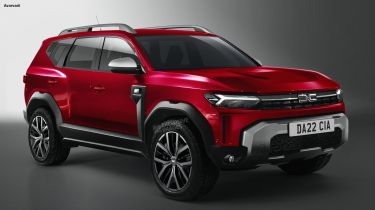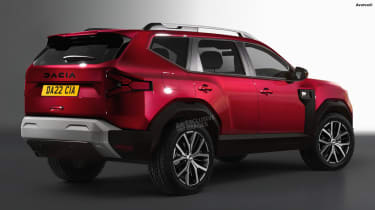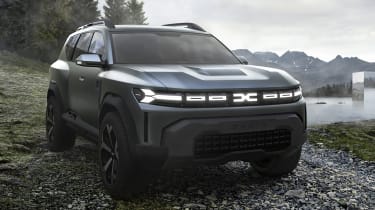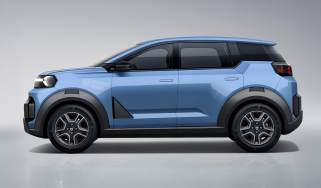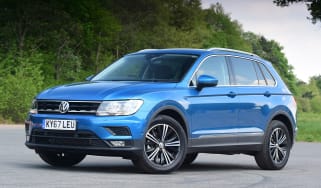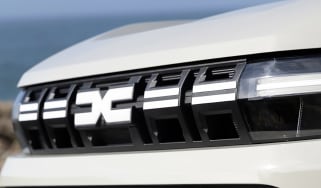New Dacia Bigster SUV confirmed for 2025 arrival
New C-segment SUV will arrive a year after the third-generation Duster SUV
Dacia has shored-up plans for a new flagship SUV to sit above the popular Duster, confirming that a model based on 2021’s Dacia Bigster concept will launch in 2025 and even naming the production site for the marque’s upcoming Volkswagen Tiguan and MINI Countryman rival.
The production version of the Bigster will be a crucial part of Dacia’s strategy to capitalise on the more profitable C-segment. Previously covered by MPVs like the Lodgy (not sold in Britain) and the Logan MCV estate, Dacia’s new-look family car line-up will combine the Jogger estate-cum-MPV with the new Bigster SUV.
The Bigster will be a crucially important car for the brand. Dacia says the SUV has been tasked with bringing “a touch of coolness” to the marque’s image, with the tough looks of the Bigster concept to carefully evolve into a production mode, as previewed in our exclusive images.
But, to make sure the Romanian brand doesn’t move too far upmarket, the company has deployed a new platform strategy. Every Dacia, including the upcoming Bigster, is now set to be based on the same CMF-B underpinnings as the Sandero hatchback.
The platform will become a one-size-fits-all solution for Dacia, with the brand stretching the underpinnings to their limits in terms of size for the Bigster and enabling the company to enter larger vehicle segments at a still-affordable price.
And serving as a warm-up act for the Bigster will be a new-generation Duster. The brand’s popular small SUV will make the move to the CMF-B underpinnings employed by the latest Sandero and the Jogger in 2024, when it will roll off the production line at Dacia’s Mioveni plant in its native Romania, which is where Bigster production will also commence from 2025.
New Dacia Bigster: platform and powertrains
Dacia previewed a concept for the Bigster in early 2021, and our exclusive images show how the finished car could look when it makes its debut. The firm has already confirmed that the SUV will measure 4.6 metres long, which is roughly the same size as the Land Rover Discovery Sport and larger than popular sellers like the Volkswagen Tiguan.
The brand has also promised a spacious interior, but whether or not the company will offer a seven-seat variant of the SUV remains unknown. However, the brand will certainly cater to buyers hankering for more space with its other two planned offerings, which includes the impressively cheap seven-seat Dacia Jogger MPV.
The CMF-B platform opens up a wide range of powertrains – including hybrid power. Hybrid drive has long been excluded from Dacia’s ranks for its high price-point, but the Bigster and the new Jogger MPV will lead the charge for the technology within the brand.
Given the SUV’s size and weight, we’re not expecting to see the naturally aspirated 64bhp 1.0-litre three-cylinder petrol engine from the very cheapest version of the Sandero. The engine simply wouldn’t have enough grunt to make the larger Bigster move at anything other than tectonic speeds.
Instead, the line-up will likely start with the turbocharged 89bhp version of the same engine. More powerful engines could also be sourced from the likes of the Captur, with Dacia potentially poaching its 128bhp 1.3-litre four-cylinder TCe 130 petrol unit.
Dacia has also hinted that the Bigster will be available with a BiFuel petrol/LPG drivetrain as found in the smaller Sandero. Hybrid drive will be another focus for the car, with buyers likely being offered the 138bhp 1.6-litre four-cylinder hybrid drivetrain in the Clio E-Tech. The same system has already been earmarked for use in the new Jogger MPV.
Renault has also confirmed that a new hybrid drivetrain designed with SUVs in mind is in development for 2022. This system uses a 1.2-litre turbocharged three-cylinder engine, and can develop up to 200bhp.
New Dacia Bigster: price and positioning
Despite the size increase and the fancy hybrid technology, Dacia won’t lose sight of its budget-conscious image with the Bigster. The company has already hinted that prices will fall into line with vehicles from the segment below – think more T-Roc than Tiguan.
With that brief set out, we’re expecting a starting price of around £20,000. That would undercut the ever-popular Tiguan by around £5,000 and trim almost £2,000 off the cost of the more economically priced Skoda Karoq.
Now read our review of the Dacia Jogger Hybrid 140...
Find a car with the experts

